Your ultimate sleep-inducing herbal tea blend should combine powerful herbs known for their calming properties. Start with chamomile, a mild sedative that promotes relaxation. Add valerian root to reduce sleep onset time and improve overall sleep quality. Include lavender for its anxiety-reducing effects and soothing aroma. Don't forget passionflower, which calms racing thoughts and eases insomnia symptoms. For flavor and added benefits, consider lemon balm, holy basil, or cinnamon. Brew these herbs together for 5-7 minutes in hot water, and enjoy your cup 30-60 minutes before bedtime. Discover how to perfect your blend and maximize its sleep-enhancing effects.
Essential Herbs for Sleep Support
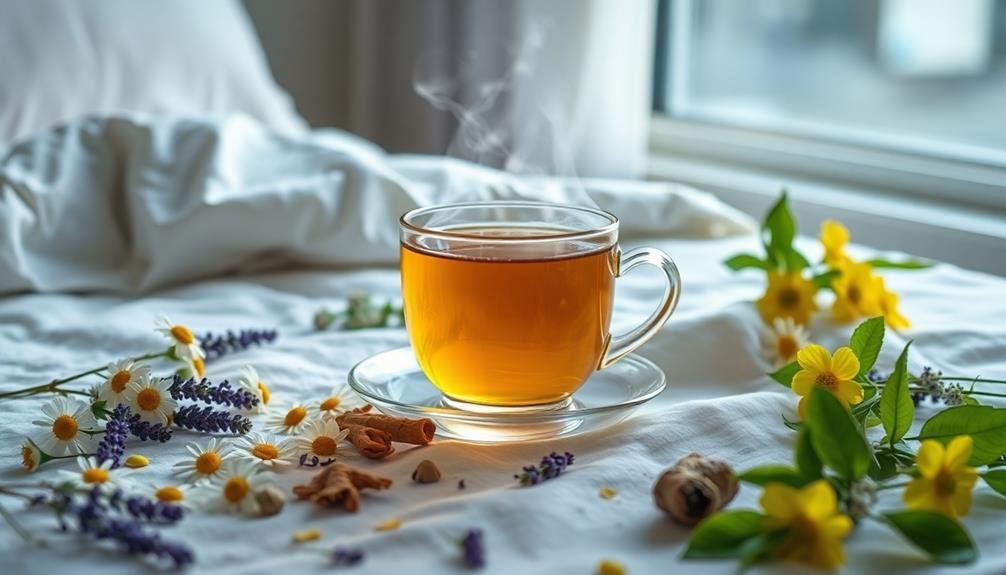
At the heart of any effective sleep-inducing tea blend are several key herbs renowned for their calming properties. Chamomile tops the list, offering mild sedative effects that can ease you into a restful state. Its gentle flavor and soothing aroma make it a popular choice for nighttime teas.
Valerian root is another powerful sleep aid, known for its ability to reduce the time it takes to fall asleep and improve overall sleep quality. While its strong taste may be off-putting to some, it's often balanced with other herbs in blends.
Lavender, famous for its relaxing scent, can also be consumed as a tea. It's been shown to reduce anxiety and promote deeper sleep.
Passionflower is less well-known but equally effective, helping to calm racing thoughts and reduce insomnia symptoms.
Lemon balm and holy basil (tulsi) round out the list of essential sleep-supporting herbs. Both have adaptogenic properties that help your body manage stress, a common sleep disruptor.
When combined, these herbs create a synergistic effect, enhancing each other's sleep-inducing qualities and offering a natural solution for better rest.
Calming Flowers in Tea Blends
When it comes to floral additions in sleep-promoting tea blends, you'll find chamomile leading the pack as nature's renowned sleep aid.
You can also harness lavender's soothing aromatherapy benefits to enhance relaxation in your nighttime brew.
For those battling anxiety-induced sleeplessness, passionflower can provide welcome relief and improve your overall sleep quality.
Chamomile: Nature's Sleep Aid
Chamomile, with its delicate white petals and golden center, stands as a cornerstone in sleep-inducing herbal tea blends. This gentle herb has been used for centuries to promote relaxation and improve sleep quality. When you sip chamomile tea, you're benefiting from its active compounds, particularly apigenin, which binds to specific receptors in your brain that may decrease anxiety and initiate sleep.
To get the most out of chamomile, steep it properly. Here's a quick guide:
| Water Temperature | Steeping Time | Amount per Cup |
|---|---|---|
| 200°F (93°C) | 5 minutes | 1 teaspoon |
| 190°F (88°C) | 7 minutes | 1.5 teaspoons |
| 180°F (82°C) | 10 minutes | 2 teaspoons |
| Cold Brew | 8-12 hours | 2 tablespoons |
You'll find chamomile in various forms, including loose flowers, tea bags, and as part of pre-mixed blends. For the best results, choose high-quality, organic chamomile and drink it about 30 minutes before bedtime. Remember, while chamomile is generally safe, it's always wise to consult with your healthcare provider if you have any concerns or allergies.
Lavender's Soothing Aromatherapy Benefits
From the fields of Provence to your teacup, lavender brings its aromatic magic to sleep-inducing tea blends. This fragrant herb isn't just for perfumes and sachets; it's a powerful ally in your quest for better sleep. When you sip lavender-infused tea, you're tapping into centuries of traditional use for relaxation and stress relief.
Lavender's sleep-promoting properties stem from its rich content of linalool, a terpene compound known for its sedative effects. As you inhale the tea's steam, these aromatic molecules interact with your olfactory system, triggering a cascade of calming responses in your brain. This aromatherapy effect can help lower your heart rate and blood pressure, preparing your body for rest.
In tea blends, lavender pairs well with other sleep-friendly herbs like chamomile and valerian root. You'll often find it in nighttime teas designed to promote relaxation and combat insomnia.
For the best results, steep your lavender tea for 5-7 minutes to fully extract its beneficial compounds. Remember, a little goes a long way – too much lavender can impart a soapy taste, so balance is key in your sleep-inducing blend.
Passionflower for Anxiety Relief
While lavender soothes with its aroma, passionflower offers a different kind of calm in your sleep-inducing tea blend. This climbing vine, native to the Americas, has been used for centuries to alleviate anxiety and promote relaxation.
Passionflower's calming effects stem from its ability to increase gamma-aminobutyric acid (GABA) levels in your brain, which helps reduce nervous system activity.
When you're crafting your ultimate sleep tea, consider adding dried passionflower leaves and petals. They'll infuse your brew with compounds like flavonoids and alkaloids that can help ease racing thoughts and restlessness.
You'll find that passionflower's slightly earthy, grassy taste complements other herbs well, making it a versatile addition to your blend.
Research suggests that passionflower may improve sleep quality by reducing the time it takes to fall asleep and increasing total sleep time. It's particularly effective for those who struggle with anxiety-related sleep issues.
Root-Based Sleep Enhancers
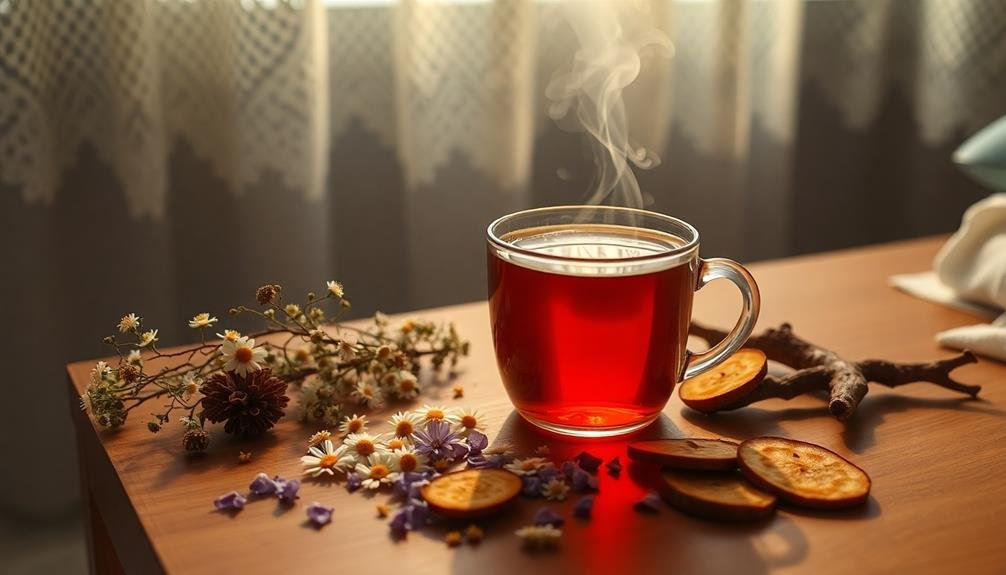
Beneath the surface of the earth lie powerful allies in the quest for better sleep. Root-based sleep enhancers offer natural, effective solutions to combat insomnia and promote restful slumber.
Valerian root, a centuries-old remedy, stands out as a potent sleep aid. It's known to increase gamma-aminobutyric acid (GABA) levels in your brain, helping you relax and fall asleep faster.
Another root to evaluate is ashwagandha, an adaptogenic herb that reduces stress and anxiety, paving the way for improved sleep quality. It's particularly effective in lowering cortisol levels, which can interfere with your sleep-wake cycle.
Don't overlook the power of ginger root, either. While it's not a direct sleep inducer, it aids digestion and reduces inflammation, both of which can contribute to better sleep.
For a milder option, try licorice root. It soothes your digestive system and can help alleviate respiratory issues that might disrupt your sleep.
When brewing your sleep-inducing tea, steep these roots for 10-15 minutes to extract their full benefits. Remember, consistency is key – incorporate these root-based sleep enhancers into your nightly routine for the best results.
Flavor-Boosting Ingredients
Three key flavor-boosting ingredients can transform your sleep-inducing herbal tea from medicinal to delightful.
First, consider adding a touch of cinnamon to your blend. This warming spice not only imparts a comforting sweetness but also helps regulate blood sugar levels, potentially improving sleep quality. A small pinch goes a long way in enhancing both taste and effectiveness.
Next, incorporate dried rose petals for a subtle floral note. They'll infuse your tea with a gentle aroma and provide mild sedative properties. Rose petals also contain vitamin C, which can support your immune system while you rest.
Lastly, don't overlook the power of lemon balm. This citrusy herb adds a bright, fresh flavor to your tea while offering natural calming effects. It's known to reduce anxiety and promote relaxation, making it an ideal addition to your sleep-inducing blend.
When combining these flavor-boosting ingredients with your base sleep-enhancing herbs, you'll create a well-rounded, palatable tea.
Experiment with ratios to find your perfect balance of taste and effectiveness. Remember, a pleasant flavor profile will encourage you to make this sleep-inducing tea a nightly ritual, maximizing its benefits over time.
Proper Brewing Techniques
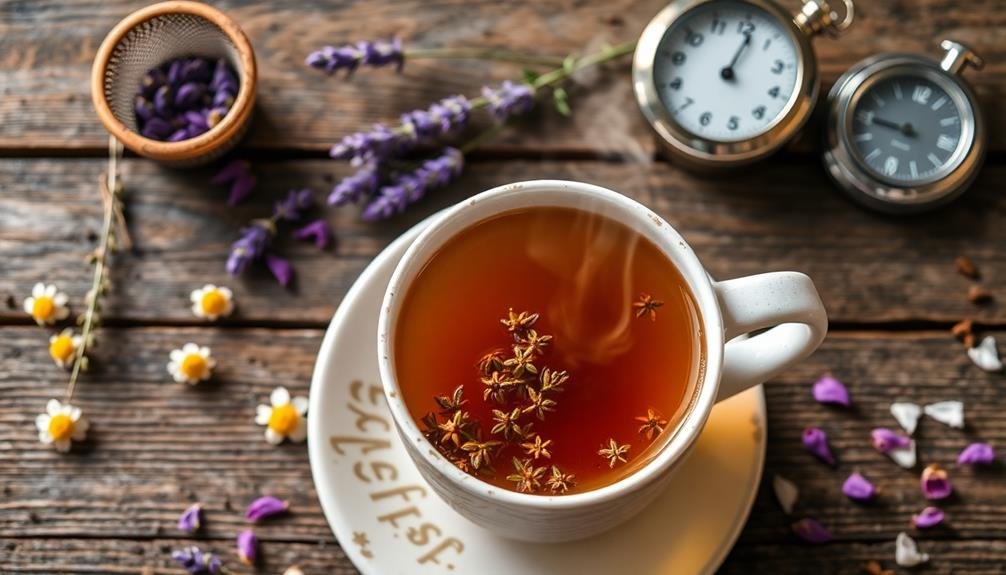
Now that you've crafted the perfect blend, it's time to focus on proper brewing techniques. Start by using fresh, cold water to fill your kettle. Bring it to a boil, then let it cool for about 30 seconds before pouring over your herbs. This slight cooling prevents scorching delicate leaves and guarantees ideal flavor extraction.
Use about 1-2 teaspoons of your herbal blend per cup of water. Place the herbs in a tea infuser or directly in your cup. Pour the hot water over them and cover to trap the aromatic oils. Let it steep for 5-7 minutes, depending on your desired strength.
Don't over-steep, as this can lead to a bitter taste. Remove the herbs or infuser when the time's up. If you prefer a stronger brew, add more herbs rather than steeping longer.
For a soothing bedtime ritual, prepare your tea about 30-60 minutes before sleep. This allows time for the herbs to take effect and for your body to process the liquid.
Sip slowly, savoring the flavors and aromas while winding down for the night.
Dosage and Timing Recommendations
In light of the potency of herbal sleep aids, it's crucial to pay attention to dosage and timing. For most sleep-inducing herbal teas, you'll want to consume one cup about 30-60 minutes before bedtime. This allows enough time for the active compounds to take effect without disrupting your sleep schedule.
When it comes to dosage, start with a single tea bag or one teaspoon of loose herbs per cup of water. If you don't notice any effects after a few nights, you can gradually increase the strength by using two tea bags or two teaspoons of herbs. However, don't exceed this amount without consulting a healthcare professional.
Remember these key points for best results:
- Consistency is key: Drink your sleep tea at the same time each night to establish a routine.
- Avoid caffeine: Don't mix sleep-inducing herbs with caffeinated teas or coffee.
- Be patient: Herbal remedies may take a few days to show noticeable effects.
If you experience any adverse reactions or your sleep doesn't improve after two weeks of regular use, discontinue the tea and consult your doctor. They may recommend adjusting your dosage or trying a different blend to suit your specific needs.
Potential Side Effects and Precautions
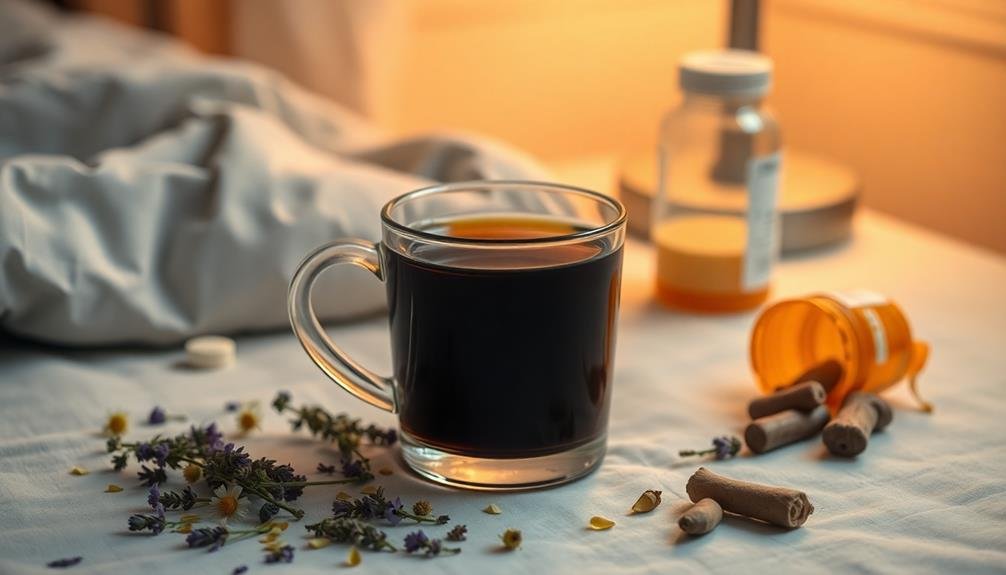
While herbal teas can be beneficial for sleep, you should be aware of potential allergies and interactions with medications.
If you're pregnant or breastfeeding, it's essential to consult your healthcare provider before incorporating sleep-inducing teas into your routine.
Always check the ingredients and start with small amounts to monitor your body's response to new herbal blends.
Allergies and Interactions
Three key considerations regarding allergies and interactions should be kept in mind when using herbal sleep teas.
First, be aware of any allergies you may have to specific herbs or plants. Common allergens in sleep teas include chamomile, which is related to ragweed, and valerian root.
Second, understand that herbal teas can interact with certain medications, potentially altering their effectiveness or causing unwanted side effects. For example, valerian may increase the effects of sedatives, while St. John's Wort can interfere with antidepressants and birth control pills.
Lastly, remember that even natural remedies can have potent effects on your body. It's essential to consult with your healthcare provider before incorporating new herbal teas into your routine, especially if you're:
- Pregnant or breastfeeding
- Taking prescription medications
- Have a pre-existing medical condition
Pregnancy and Breastfeeding Concerns
Pregnant and breastfeeding women need to be especially cautious when considering herbal sleep teas. Many herbs that are generally safe for most adults can pose risks to developing fetuses or nursing infants.
For example, chamomile, a common ingredient in sleep teas, may increase the risk of miscarriage if consumed in large quantities during pregnancy.
Valerian root, another popular sleep aid, hasn't been extensively studied in pregnant or breastfeeding women, so it's best avoided. The same goes for passionflower and lemon balm. While these herbs might be safe in small amounts, there's not enough research to guarantee their safety during pregnancy or lactation.
If you're pregnant or breastfeeding and struggling with sleep, consult your healthcare provider before trying any herbal remedies. They might suggest safer alternatives like warm milk with honey or specific pregnancy-safe teas.
Remember, even natural remedies can have powerful effects on your body and your baby's development.
Always read labels carefully and avoid blends containing herbs known to stimulate uterine contractions, such as raspberry leaf, in early pregnancy. Your sleep is important, but your baby's safety is paramount.
Frequently Asked Questions
Can Sleep-Inducing Herbal Teas Be Consumed During Pregnancy or Breastfeeding?
You should consult your healthcare provider before consuming sleep-inducing herbal teas during pregnancy or breastfeeding. Some herbs can be unsafe for expectant or nursing mothers. It's best to err on the side of caution and seek professional advice.
How Long Does It Take for Sleep-Inducing Herbal Teas to Show Effects?
You'll typically feel the effects of sleep-inducing herbal teas within 30-60 minutes after drinking. However, it's not instant; your body needs time to absorb the compounds. For best results, drink it about an hour before bedtime.
Are There Any Age Restrictions for Drinking Sleep-Inducing Herbal Teas?
You'll find that most sleep-inducing herbal teas don't have age restrictions. However, it's best to consult your doctor before giving them to children or if you're pregnant, nursing, or taking medications. Always follow recommended dosages.
Can Sleep-Inducing Herbal Teas Interact With Prescription Medications or Supplements?
Yes, sleep-inducing herbal teas can interact with medications and supplements. You should always consult your doctor before combining them with prescriptions. They might affect drug absorption, potency, or side effects. Don't risk your health; seek professional advice first.
Are There Alternatives for Those Allergic to Common Ingredients in Sleep-Inducing Teas?
If you're allergic to common sleep tea ingredients, don't worry! You've got options. Try lavender or lemon balm essential oils, magnesium supplements, or tart cherry juice. You can also practice relaxation techniques like deep breathing or meditation.
In Summary
You've now learned the key components of a potent sleep-inducing herbal tea blend. Remember, it's not just about the ingredients; proper brewing and timing are essential. Start with small doses and listen to your body's response. While these teas can be incredibly helpful, they're not a cure-all. If you're struggling with persistent sleep issues, don't hesitate to consult a healthcare professional. Sweet dreams await you!

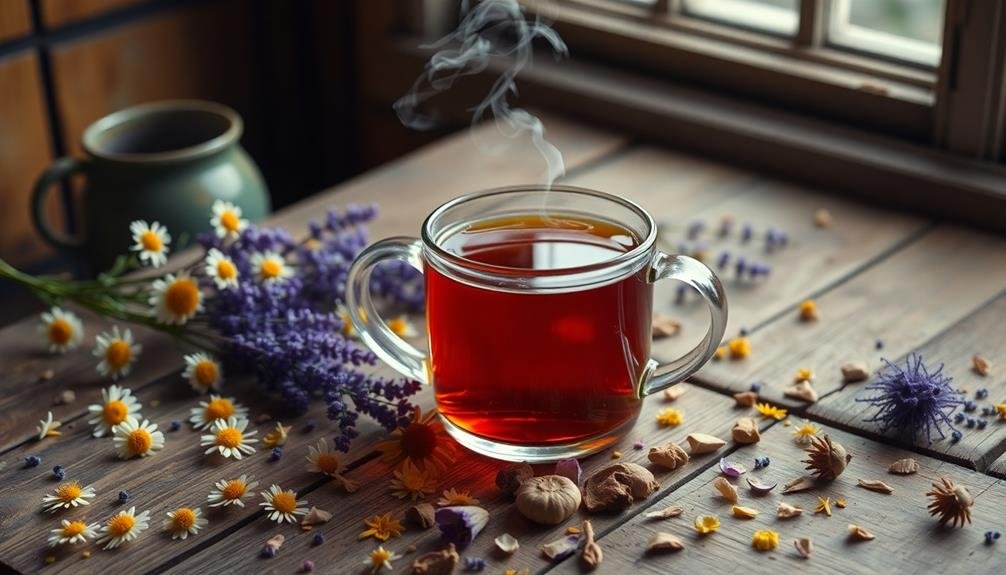



Leave a Reply